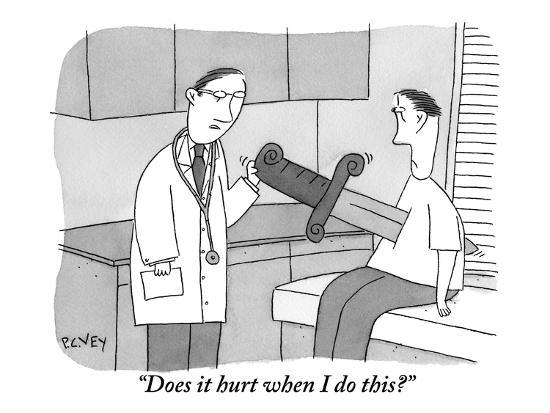
All too often have I heard — and thought myself — that from a Christian perspective suffering is the doorway to new life and to freedom, even that suffering is good. Even that it is beautiful. Yet as Kate Bowler and others have so eloquently pointed out, this concept seems misguided at best — though at times, one supposes, it can be true.
Retrospectively, you might believe you have suffered for a reason, or learn to be fine with it. Recovering addicts can look back on a “rock bottom” and see it as the moment life changed for the better. But not always. Tough as it may be to envision, rock bottom is a ditch some never get out of. Sometimes pain is just that.
Last week, a challenging piece was published in the New Yorker, Ariel Levy’s “World Without Pain.” That title is asking for a response from religious readers. Lucky for any of you who don’t like to read, the beginning is the important part, and I have excerpted that here. It’s a sharp rejoinder to what many Christians say, often breezily, about suffering.
We like to think that what doesn’t kill us makes us stronger, or more resilient, or…something. Deeper. Wiser. Enlarged. There is “glory in our sufferings,” the Bible promises. “Suffering produces perseverance; perseverance, character; and character, hope.” In this equation, no pain is too great to be good. “The darker the night, the brighter the stars,” Dostoyevsky wrote. “The deeper the grief, the closer is God!” We atheists get in on the action by insisting that the agony of loss elucidates the worth of love. The hours spent staring into the dark, looping around our own personal grand prix of anxieties, are not a waste of time but a fundamental expression of our humanity. And so on. To be a person is to suffer.
But what if our worst feelings are just vestigial garbage? Hypervigilance and pricking fear were useful when survival depended on evading lions; they are not particularly productive when the predators are Alzheimer’s and cancer. Other excruciating feelings, like consuming sadness and aching regret, may never have had a function in the evolutionary sense. But religion, art, literature, and Oprah have convinced us that they are valuable—the bitter kick that enhances life’s intermittent sweetness. Pain is what makes joy, gratitude, mercy, hilarity, and empathy so precious. Unless it isn’t.
I find this indictment of religion, like most of its kind, a little half-hearted. The biblical excerpt — “Suffering produces perseverance; perseverance, character; and character, hope” — deserves a closer look. Paul’s statement is actually very valuable, not to mention encouraging. When he wrote that, he had experienced tremendous hardship and had begun to understand that these experiences had led him to places he couldn’t have otherwise seen himself getting to.
Still, that doesn’t mean his suffering was reasonable or necessarily had to happen. Paul wasn’t explaining suffering; he was making peace with it (as referenced in v. 1 of that same passage). Paul was demonstrating that a man like him could learn to be okay with how things turned out and that God was not beyond his worst experiences; God was drawing him through them, going with him through them. In other words, from a religious perspective, suffering can be a doorway, because everything can be a doorway.
To be a Christian, you might think you have to have answers. But you don’t have to have an answer for pain. There is none. Humans have searched near and far for it, in all religions, times, and time zones. Trying to explain these things only makes them all the more obscure. To try is worse than admitting you don’t know what’s going on or why.
In Levy’s piece, we meet a woman who for some reason feels no pain. She doesn’t notice when her hand is cut with a kitchen knife. She never feels anxious or panicked. She experiences suffering only as an abstract concept. Levy dares us to imagine, then, a world where everyone is like this — a world without pain. How does such a vision make you feel?
Me? Uncomfortable. For some reason my immediate reaction is to think that pain must be an important part of life, it must be, in fact, inextricable. I want to believe it is worth something. A world without pain feels cheap, somehow not-right. I worry about soma. I worry about losing some core part of myself.
Because who would we be without the things we have survived, our ravaged family histories, the stories of despair, the thorns in our sides? Is pain, somehow, an essential part of “humanity”? And if it were, would that make it better?
I don’t think so. What would make it better would be — as Levy suggests — if there were no more pain at all.
But as fine a fancy as this is, the real problem becomes apparent: that is not reality. Most of us, most of the time, are in pain, existential, physical, emotional. Pain seeks us out, and we seek it out. We sabotage just to keep things interesting. We pursue suffering, often brazenly, through over-working, over-exercising, or accumulating battle scars to find our self-esteem in. We also compare suffering, rank ourselves with it. We think that whoever has suffered the most has the most authority. Which seems both natural and unproductive.
Soothing medication, genetic aberrations, the alleviation of all our pain: it would be so nice. Moreover, we should hope for it. This is, after all, the vision we are promised: a world where there is no more weeping, no more pain, no more sorrow or death. In Christianity, suffering is not beyond God’s purview, but it is not good either. We long for a world where there is none.
One thing I love about Christianity is that Jesus experienced pain. You might think, How sadistic! But I’ve studied some other religions and never developed much patience for them, or any worldview where “God” would not live through what we have lived through. I don’t have the capacity not to be bitter.
Truthfully the cross lessens my bitterness. I see Christ suffering and am less angry at what he represents. I feel less alone. Perhaps of equal importance, I don’t fully understand what I am looking at, when I am looking at the cross; I am reminded of mystery and my humble position before it. I am reminded to look for God in unexpected places. I am reminded of Paul’s promise, that suffering may become something as yet unimaginable, even endurance, character, hope.
Almost like medication, this vision — that emaciated man and the bowed bars of wood, and his weight pulling the nails that keep him there — eases some pain, if only the internal kind, which so often accompanies the physical.
But unlike medication, it’s free.
Above cartoon: from The New Yorker. Featured imaged, edited: from Wellcome Images. Engraving, c. 1760, after C. Le Brun.

COMMENTS
4 responses to “When Your Theology of Pain Is Painfully Bad”
Leave a Reply














I went and tried to read it. It isn’t all that well written and generally never really takes seriously the opposite view, except as a straw creature against which to build a weak case. The last couple of lines reminds one of materialists who seem to find no spiritual cause or need anywhere in the world or in life. “When we check a Facebook page and find out our partner has cheated on us, our brain still mounts that same biological response, even though it has zero value to us anymore.” Even Hill—who told me how disastrous it would be for human beings to float through life without anxiety—conceded, ‘Maybe Jo is the next evolutionary step.’”
For sure Levy is an atheist, as she notes, and it’s fair to say she’s searching for a material justification for suffering. I found her argument that there may be none useful
I appreciate your thoughts here. I agree that knowing we have a high priest that understands our suffering is a comfort. Trying to figure out the purpose of suffering quickly turns into a burden. Thanks.
It makes perfect sense, but ignores the mental health struggles some of us go through, and the fact that most fellow Christians berate our “depression” as not being faithful enough. Depression is a disease. Jesus above all was love. Pure unconditional love. That’s hard for most to grasp. Would love to see more of the “I don’t understand but you’re hurting. That’s so terrible. “. Instead most Christians I encounter later usually just have judgement. Driven me away.